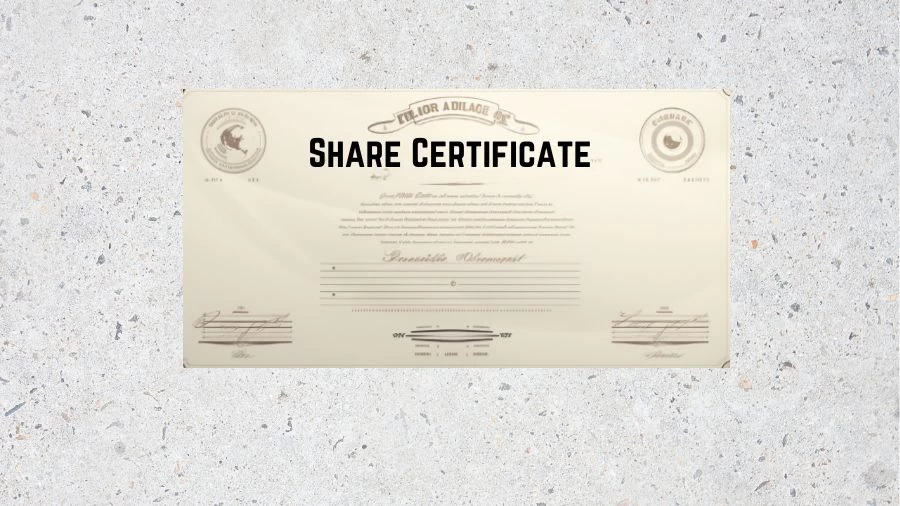
What is a Share Certificate? What is the Difference Between a Share Certificate and CD?
A share certificate is a digital document confirming ownership of company shares, while Certificates of Deposit (CDs) are bank-issued savings instruments with guaranteed interest rates and penalties for early withdrawal.
Published Aug 05, 2023 | Updated Dec 27, 2023 | 📖 5 min read
What is a Share Certificate?
A share certificate, also known as a stock certificate, is a formal document issued by a corporation to shareholders, serving as legal evidence of their ownership of a specific quantity of company shares. Traditionally physical, these certificates are now often in digital form, simplifying the issuance process and enhancing record-keeping efficiency.
Shareholders receive these certificates as proof of their ownership, and in case of loss or damage, replacement certificates can be obtained through the company's transfer agent. The transition to digital certificates has modernized the system, reducing costs and facilitating accurate record-keeping.
What is the Difference Between a Share Certificate and CD?
A share certificate, also known as a stock certificate, is a formal document issued by a corporation to shareholders, providing legal proof of their ownership of a specific number of company shares. Historically, share certificates were physical documents, but in today's digital age, they are rarely issued in paper form. Instead, digital records are used to reflect ownership.
|
Aspect |
Certificates of Deposit (CDs) |
Share Certificates |
|
Offered by |
Banks |
Credit Unions |
|
Earnings |
Interest at a guaranteed rate |
Dividends from credit union profits |
|
Withdrawal |
Penalty for early withdrawal before term ends |
Penalty for early withdrawal before term ends |
|
Flexibility |
Some types offer flexibility (e.g., no-penalty CDs, bump-up CDs) |
Similar penalties for early withdrawal |
|
Insurance |
Insured by the Federal Deposit Insurance Corporation (FDIC) up to $250,000 per depositor, per ownership category, per institution |
Insured by the National Credit Union Administration (NCUA) up to $250,000 per depositor, per ownership category, per institution |
How Does the Functioning of Share Certificates Work?
Share certificates, also known as certificates of deposit (CDs), are financial instruments offered by credit unions and banks. They operate on a fixed-term basis, allowing individuals to deposit money for a specified period. Understanding how share certificates function is crucial for making informed financial decisions.
Opening and Depositing Funds
To initiate a share certificate, individuals select a specific term length and deposit money into the account. Some institutions require a minimum opening deposit. Once the funds are deposited, the term begins, during which no additional deposits or withdrawals are allowed. This initial deposit forms the basis for earning interest over the certificate's duration.
Earning Dividends and Compounding
While the money is held within the share certificate, the credit union pays dividends to the account holder. Dividends can be compounded daily or monthly, allowing for the interest to accrue not just on the initial deposit but also on previously earned interest. This compounding effect leads to the growth of the invested funds over time.
Restrictions and Penalties
One of the key features of share certificates is their restriction on fund access. Withdrawals before the maturity date typically result in penalties, discouraging premature access to the deposited funds. These penalties serve as a deterrent, ensuring that investors adhere to the agreed-upon term and maximize their returns.
Maturity Options
Upon reaching the end of the term, the share certificate matures, presenting the account holder with several options. They can choose to roll over the funds into another share certificate, adopting strategies like the CD ladder for optimal returns.
Are Share Certificates Still Issued by Companies?
In today's digital-driven financial landscape, the issuance of physical share certificates by companies has become increasingly rare, with many businesses opting for digital ownership tracking systems. Even prominent corporations like Disney transitioned to digital records in 2013, making it more challenging and costly to obtain share certificates as they are gradually phased out to align with modern technology and efficiency trends.
How Can One Obtain a Share Certificate?
To obtain a share certificate, research companies that issue them, contact your broker or the transfer agent, understand the costs, and consider your preferences and investment goals.
Research Companies
Identify companies that still issue paper stock certificates. Not all companies offer this option, so research and find a company that aligns with your investment needs.
Contact Your Broker
If you already own digital shares in a company that issues paper stock certificates, get in touch with your broker. Reach out to the broker's customer service department and inquire about the process to convert your digital shares into physical certificates. They have the necessary purchase records and can assist you in this process.
Understand the Costs
Be aware that obtaining a physical share certificate often comes with a significant cost. Brokers typically charge fees for this service, which can be substantial, sometimes reaching up to $500 per certificate. Understand the fees involved and be prepared to pay if you decide to proceed with obtaining a share certificate.
Consider Direct Contact with Transfer Agent
Alternatively, you can bypass the broker and contact the transfer agent of the company directly. Transfer agents manage stockholder records and handle the issuance of stock certificates. Reach out to the transfer agent of the company you are invested in and inquire about the specific requirements and procedures for obtaining a physical share certificate.
Evaluate Your Decision
Consider the pros and cons of owning a physical share certificate versus digital shares. Evaluate your investment goals, preferences, and the associated costs. Make an informed decision based on your needs and preferences, keeping in mind the fees involved and the convenience of owning physical certificates compared to digital shares.
Who Should Consider Opening a Share Certificate or CD?
Individuals who prioritize safety and stability in their investments, particularly those who are risk-averse or nearing retirement and wish to avoid the gamble of losing money, should consider opening a share certificate or Certificate of Deposit (CD). These financial instruments offer locked-in rates, ensuring a predictable and stable return on investment, unlike high-yield savings accounts or money market accounts with variable rates.
Share certificates and CDs are especially suitable for those seeking extremely safe options, providing a secure way to grow their money without the risks associated with market fluctuations.
What is a Share Certificate - FAQs
1. What is a share certificate?
A share certificate is a formal document proving ownership of company shares.
2. How do share certificates differ from CDs?
Share certificates offer dividends from credit union profits, while CDs provide interest at a guaranteed rate.
3. Can I withdraw funds early from a share certificate?
Yes, but early withdrawals typically incur penalties.
4. Are physical share certificates still issued by companies?
They are becoming rare as digital ownership tracking systems are favored.
5. Who should consider opening a share certificate or CD?
Individuals seeking safe and stable investments, especially those nearing retirement, should consider these options for predictable returns.




